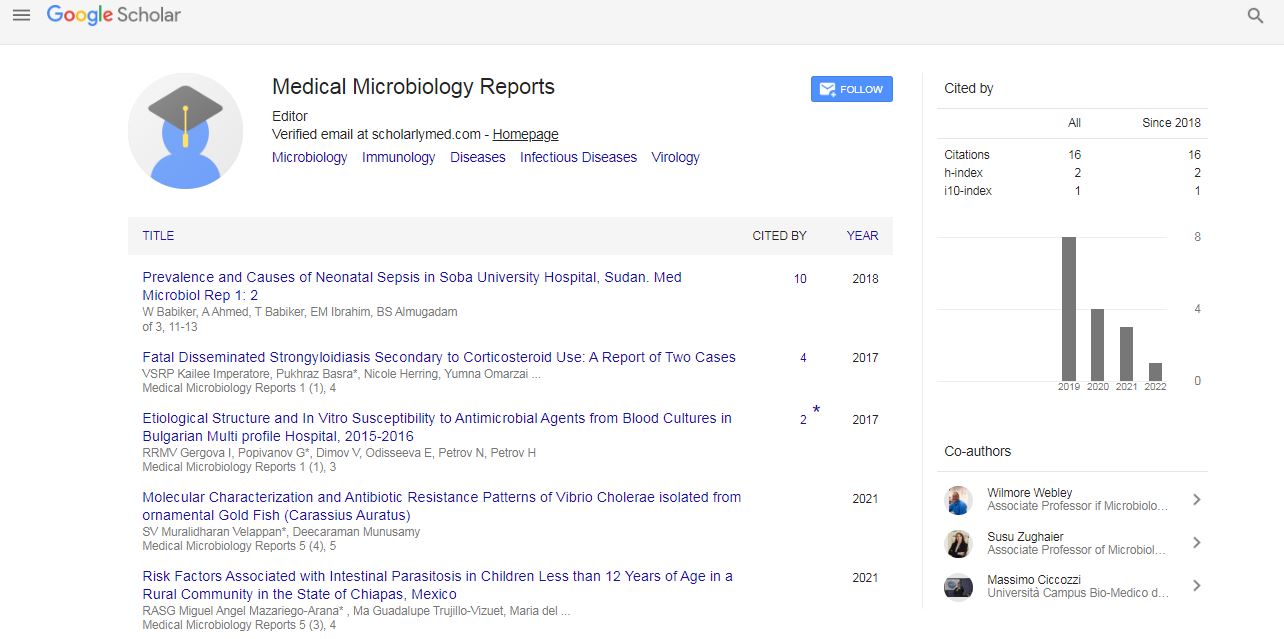Perspective, Med Microbiol Rep Vol: 7 Issue: 4
Evaluating Advanced Strategies for Disease Diagnosis and Detection
Qijun Hiroyuki*
1Department of Medical Technology, Peking University, Beijing, China
*Corresponding Author: Qijun Hiroyuki,
Department of Medical Technology,
Peking University, Beijing, China
E-mail: qijuhiroy@pku.edu.cn
Received date: 24 November, 2023, Manuscript No. MMR-24-128554;
Editor assigned date: 27 November, 2023, PreQC No. MMR-24-128554 (PQ);
Reviewed date: 11 December, 2023, QC No. MMR-24-128554;
Revised date: 18 December, 2023, Manuscript No. MMR-24-128554 (R);
Published date: 26 December, 2023, DOI: 10.4172/MMR.1000359
Citation: Hiroyuki Q (2023) Evaluating Advanced Strategies for Disease Diagnosis and Detection. Med Microbiol Rep 7:4.
Description
The disease diagnosis and detection has undergone a revolutionary transformation with the advent of advanced technologies and innovative strategies. Moving beyond traditional methods, these emerging approaches are improving the way one can identify and manage various health conditions. One can learn and evaluate the advanced strategies that are propelling disease diagnosis into a new era of precision and efficiency. One of the most sophisticated advancements in disease diagnosis is the use of genomic information. Genomic medicine involves analyzing an individual's Deoxyribonucleic Acid (DNA) to understand the susceptibility to diseases, predict potential risks and customize treatments. Techniques like Next-Generation Sequencing (NGS) have made it possible to decipher entire genomes, offering unparalleled inputs into the genetic basis of diseases.
Traditional biopsies can be invasive and sometimes impractical. Enter liquid biopsies, a non-invasive approach that involves analyzing components such as circulating tumor DNA (ctDNA) or RNA in the blood. This method is particularly valuable for the early detection of cancers, monitoring treatment responses and tracking the evolution of tumors over time. Advanced imaging technologies have transformed the field of disease detection. Magnetic Resonance Imaging (MRI), Computed Tomography (CT) and Positron Emission Tomography (PET) scans provide detailed inputs into the internal structures of the body, aiding in the detection and characterization of various diseases, from cancer to neurological disorders. Artificial Intelligence (AI) is increasingly integrated into disease diagnosis and detection. Machine learning algorithms analyze vast amounts of medical data, helping to identify patterns, anomalies and potential indicators of diseases.
AI is particularly beneficial in radiology, pathology and interpreting complex datasets for more accurate and efficient diagnoses. Point-of- Care Testing (POCT) represents a paradigm shift by providing rapid and on-the-spot diagnostic results. Devices like handheld analyzers and portable diagnostic tools enable healthcare professionals to conduct tests at the sleeping surface, in clinics or even in remote settings. This approach is invaluable for quick decision-making and timely interventions. The integration of biosensors and smart technology has generated a new era of continuous health monitoring. Devices capable of tracking biomarkers, vital signs and other health parameters in real-time provide early detection of anomalies, providing individuals and healthcare providers with valuable data for preventive interventions. Microfluidics involves manipulating small volumes of fluids on a microscale, enabling precise and efficient diagnostic tests. These miniaturized devices are used for tasks such as detecting specific biomarkers, analyzing blood samples and conducting molecular assays.
Conclusion
Microfluidic platforms contribute to faster and more cost-effective diagnostics. Telemedicine has become an integral part of healthcare, allowing individuals to consult with healthcare professionals remotely. Remote monitoring technologies enable the continuous tracking of health parameters, facilitating early detection of changes that may indicate the onset or progression of diseases. Disease diagnosis and detection has evolved dramatically with the integration of advanced strategies and technologies. From genomic medicine and liquid biopsies to artificial intelligence and point-of-care testing, these innovations are revolutionizing healthcare by enhancing precision, efficiency and accessibility. As one can continue to evaluate and refine these advanced approaches has the possibility of earlier and more accurate disease diagnoses, leading to improved outcomes and a transformative impact on global health. The ongoing synergy between technological advancements and medical science is shaping a new era where diseases can be detected and managed with unprecedented precision and effectiveness.
 Spanish
Spanish  Chinese
Chinese  Russian
Russian  German
German  French
French  Japanese
Japanese  Portuguese
Portuguese  Hindi
Hindi 
